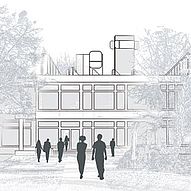
Einführung ins Programmieren mit Python (52806, 4SWSt, 6 LPs)
![]()
(Bild aus Wikipedia)
Die Sprache Python – benannt nach der britischen Anarcho-Komiker-Truppy Monty Python – ist sicherlich kein Witz. Erstmals veröffentlicht im Jahre 1990 und seither kontinuierlich weiterentwickelt hat Python sich einen festen Platz in der Welt des Programmierens erkämpft. Besonders in der Welt des Machine Learning und für wissenschaftliche Anwendungen erfreut sich die Sprache großer Beliebtheit. Neben dem Sprachdesign, das schnelle und flexible Entwicklung erlaubt, ist die Verfügbarkeit von vorgefertigten Libraries (Sammlungen von Programmroutinen aus Bereichen wie Linearer Algebra, Grafischen User-Interfaces oder Datenanalyse) ein großer Pluspunkt.
In The Zen Of Python wird die Philosophie der Sprache zusammengefasst in den Punkten:
- Beautiful is better than ugly.
- Explicit is better than implicit.
- Simple is better than complex.
- Complex is better than complicated.
- Readability counts.
Entsprechend diesen Maximen wird im Kurs Einführung ins Programmieren mit Python in einfachen Schritten gezeigt, welche Bauelemente die Sprache Python bietet, und wie mit diesen komplexe Aufgaben bewältigt werden können. Dabei wird ein Fokus auf Fragestellungen der Naturwissenschaften gelegt. Zusätzlich werden allgemeine Ideen der Algorithmik und Aspekte der Programmierung unabhängig von der verwendeten Programmiersprache behandelt.
Sprache
Vorlesungssprache ist Deutsch.
Die Kursunterlagen werden jedoch ausschließlich in englischer Sprache bereitgestellt.
Behandelte Themen
Der Anfängerkurs behandelt diese Themen:
- Arbeitsumgebung: Interpreter und Compiler, Arbeitsverzeichnis, Kommunikation mit der Maschine
- Grundlagen der Sprache Python: Variablen, Datentypen, Schleifen, Kontrollstrukturen
- Objektorientierung: Klassen, Methoden, Dunders, Vererbung
- Ausgewählte Pakete für die wissenschaftliche Arbeit: numpy, matplotlib
Voraussetzungen und Vorkenntnisse
- Es werden keine Programmierkenntnisse vorausgesetzt.
- Umgang mit Debian (für den Kurs werden die Rechner im Linux-CIP-Pool verwendet).
- Alternativ kann ein eigener PC (Laptop) genutzt werden, da alle verwendeten Werkzeuge plattformunabhängig und quelloffen sind (Windows, macOS, beliebige Linux -Distribution).
- Englischkenntnisee, da die Kursunterlagen und Teile der Dokumentation nur in Englisch verfügbar sind.
Anforderungen zum erfolgreichen Bestehen (Projekt)
- Aktive Teilnahme an den Übungen
- Abgabe eines selbstgewählten und selbst (alleine oder in zweier Gruppen) umgesetzten Abschlussprojekts nach Absprache mit dem Dozenten. Eine Auswahl an Themenvorschlägen wird gestellt.
- Weitere Modalitäten werden vom Dozenten während des Kurses bekanntgegeben



